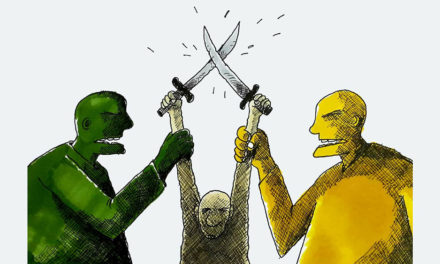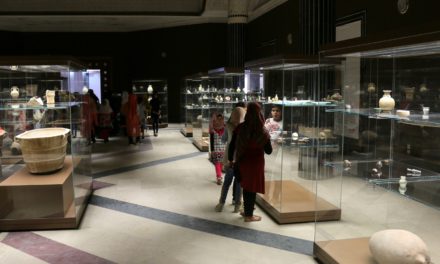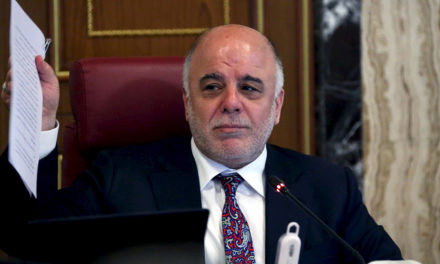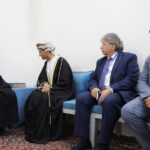(Iraqi flags being sold in Kirkuk/Reuters)
It has been one year since of the Government of Iraq reasserted federal control over the province of Kirkuk, which had been under the supervision of the Kurdish Peshmerga Forces since 2014. The Peshmerga are military wings of the two main Kurdish parties tasked with providing security for the semi-autonomous Kurdistan Region of Iraq (KRI). Since Kirkuk is not part of the KRI, there were fears that the Peshmerga’s presence alone could reignite the fragmentation of Iraq along ethnic lines even after Da’ish is defeated. Iraq’s Prime Minister and Commander in Chief, Haider Al-Abadi guaranteed that this would not be the case under his leadership and tactically forced Peshmerga troops back to the Kurdistan Regional Government’s (KRG) jurisdiction and ensured the province of Kirkuk adhered to its legal status as a federal province of Iraq.
There are many lessons to be learnt in the manner in which Prime Minister Abadi handled the situation. As brave Iraqi soldiers fought for three and a half years to free their nation from Da’ish occupation, the liberation of each village, town and city and defeat of the enemy was celebrated. However, when Kirkuk returned to the supervision of federal Iraqi forces, Abadi made sure the same language would not be used regarding Kirkuk. He constantly reminded everyone that Kirkuk was not being liberated because it was temporarily under their brethren, the Peshermga’s watch and not illegally occupied by Da’ish terrorists. The language used was important as it set an example for how the event should be handled. A year on, it is important to continue to follow his lead.
Many on social media celebrated the return of Kirkuk to federal forces and did so once again on its anniversary, but it is important to keep in mind the celebration is for their reassurance in maintaining the unity of Iraq and not as a victory for Arab Iraqi forces over Kurdish Iraqi forces. Shortly after the confusion and fear of the Kirkuk operations, many Kurdish citizens returned to their homes in the city, after being reassured they would not be harmed. One does not have to be reminded that Kirkuk is a sensitive area and inflaming such tensions is unnecessary, especially when all Iraqis should be celebrating their united effort to defeat Da’ish together.
What is a cause for celebration is the success Iraqi forces have seen in their recent efforts to suffocate any Da’ish resurgence in the province. Kirkuk’s proximity to former Da’ish bastions in Diyala, Ninawa and Salahuddin in addition to terror strongholds within its provincial borders, such as the districts of Hawijah, Al-Zab and Rashad, means the people of Kirkuk find themselves at the forefront of Iraq’s war on terror. The province is a lucrative prize for Da’ish, not only due to its location but also its substantial oil reserves and its ethnic diversity, which can be manipulated to trigger instability in northern Iraq.
For years under the rule of the Peshmerga, Da’ish avoided opening too many fronts or carrying out repetitive terror attacks in Kirkuk city due to the fact that Da’ish collaborators and oil smugglers were raking in millions of dollars for the organization by siphoning oil from fields and pipelines. This racket was an important income for the terror organization and drawing too much focus on its cells in the province could have threatened its oil business. However, once Baghdad reasserted federal control over the province’s oil reserves, Da’ish lost this revenue stream and no longer had any reason to stay quiet.
In the months that followed the retaking of Kirkuk, there were a flurry of attacks in and around the city, ranging from car bombs and IEDs (Improvised Explosive Devices) to fake checkpoints on the main highways in the province. This was the response from a broken yet vengeful Da’ish and was seized upon by Kurdish media outlets as demonstrative of why only Kurds should rule the province, completely ignoring the fact that the Peshmerga did not have to deal with such violence due to their tendency to ignore Da’ish oil smuggling in Kirkuk.
Nonetheless, Iraqi forces absorbed the tide of Da’ish activity in Kirkuk and have responded with more than 50 waves of clearing operations across Hawijah, Riyadh, Al-Zab, Dibis, Taza and Daquq districts. The relentless nature of Iraqi operations, spearheaded by elite Federal Police units, has led to the destruction of more than 600 safe-houses, IED factories, weapons caches and tunnel networks in Kirkuk province in 2018 so far. This monumental achievement has dramatically diminished Da’ish activity in Kirkuk and has pushed many militants back into hiding.
However, the job is far from done and Kirkuk still experiences intermittent violence. A car bomb blast last weekend in the Al-Mamdouda neighbourhood in Kirkuk city left 8 civilians wounded. Within 24 hours, Iraqi security forces were able to track down and detain the two brothers suspected to have been behind the attack, who had fled to Mosul. Waves of IED attacks in the province do occasionally occur but the ineffectiveness and low casualty tolls from such attacks point to Da’ish not being able to rebuild significant operational capabilities in Kirkuk, something which has to be credited to the ongoing efforts of Iraq’s security and intelligence services.
Worryingly, there is a cloud of ambiguity over some of the IED attacks in Kirkuk with many locals, especially within the Turkmen community, claiming that Kurdish operatives are behind a chunk of the terror attacks. The reasoning is that Kurdish politicians see an unstable Kirkuk as one that can be eventually taken back from Baghdad. Shakwan Abdullah, a senior KDP leader, recently expressed that outgoing Prime Minister Abadi should be held responsible for the “genocide” he unleashed in Kirkuk and called for foreign military intervention in the city, wrapping up his laughable comments by predicting uprisings in Kirkuk should nothing be done to satisfy Kurdish grudges over the events of October last year. The acting chairman of Kirkuk’s provincial council stated earlier this week that Hashd Al-Sha’abi (PMUs) forces in Kirkuk are still holding 4 KDP and Turkmen People’s Party officials in custody and compared, rather dramatically, the PMUs to the Ba’ath regime, labeling them as “oppressive forces”. This inflammatory rhetoric from Kurdish officials must be curtailed by Erbil sooner rather than later or it might have unfortunate consequences for the stability of Kirkuk.
A year on, there continues to be much to celebrate together. Iraq is nearing the end of forming yet another democratically elected government and once again witnessing the peaceful transfer of power. We have seen the election of Barham Salih as the President of the Republic, a candidate who shows a lot of promise to the unity of this country. His political past and hiccups will always follow him, but what he does in these next four years will determine his status in Iraq’s history books. The appointment of Adil Abdul-Mahdi for Prime Minister also presents a lot of promise to Iraqi unity. Adil has a history of fighting alongside Iraqi Kurds against the former regime of Saddam Hussein. Like Abadi, Abdul-Mahdi will most likely continue the diplomatic and statesman approach to leading the country, something Iraqis have become accustomed to from Baghdad in the past four years.
The reinforcement of Iraq’s sovereignty with the events in Kirkuk last year, alongside the territorial defeat of Da’ish are the first steps in the road to rebuilding a federal and democratic Iraq. Many towns and cities will continue to be mired in the dispute between Baghdad and Erbil over whose jurisdiction they fall under, such as Sinjar and Al-Qosh. The politics of disputed lands must be resolved and their people, who are no less Iraqi citizens than Arabs and Kurds, need all the support that can be mustered by both the international community and all levels of government within the Iraqi state.

Hamzeh Hadad











